Racism

A top Southern Baptist official who was accused of plagiarism in a radio segment that claimed civil rights leaders and President Obama used the Trayvon Martin case to stir racial tensions will lose his weekly call-in program but can keep his main job, a church panel announced Friday.
Richard Land, the influential head of the Southern Baptist Convention's Ethics & Religious Liberty Commission and the denomination’s top policy spokesman, was rebuked for racial insensitivity and for not attributing the source of his radio commentaries after a review by ERLC trustees.
The controversy over Land’s explosive remarks in a March 31 radio program was especially awkward as Southern Baptists are expected to elect an African-American pastor, the Rev. Fred Luter, as the denomination's first black president later this month.
The investigators chided Land for “his hurtful, irresponsible, insensitive, and racially charged words” in a broadcast of the “Richard Land Live!” show in which Land accused Obama and black civil rights activists of using the Trayvon Martin shooting to foment racial strife and boost the president’s re-election chances.
Watching TV is bad for kids' self-esteem, except if they're white boys. (Seems likely that too much TV is bad for everyone's esteem for their fellow humans, made in the image of God ...)
"A new study suggests exposure to today’s electronic media often reduces a child’s self-worth.
Indiana University researchers say this is the case if you are a white girl, a black girl or a black boy.
However, researchers believe the media exposure can help the self-confidence of white boys.
... In the study, the researchers surveyed a group of about 400 black and white preadolescent students in communities in the Midwest over a yearlong period."
Read more here.
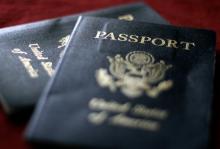
The debate over immigration policy and border security often focuses on the border shared by the United States and Mexico. However, The New York Times recently offered a revealing and troublesome picture of efforts by the U.S. Border Patrol along the dividing line between the US and Canada.
According to the report, the border agents “hover outside the warehouse where Mexican immigrants sell the salal they pick in the temperate rain forest. Sometimes they confront people whose primary offense, many argue, is skin tone.”

North Carolina's Racial Justice Act was just a piece of legislation until this morning, when Judge Gregory Weeks set aside a death penalty sentence that had been meted out to Marcus Robinson in 1994.
At issue this morning was not whether Robinson was guilty of first-degree murder. At issue was whether “racial bias” had prevented the “fair and reliable imposition of the death penalty in North Carolina.”
Judge Weeks found that racism was indeed at work in Robinson’s sentencing. There is, Weeks said, “considerable evidence of the continuing effects of racial prejudice in the application of the death penalty.” Specifically, Weeks found that racism guided the selection of Robinson’s jury, thus compromising Robinson’s right to trial by impartial jury. In accordance with the Racial Justice Act, Robinson will now serve a term of life imprisonment without parole.
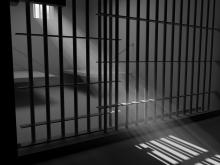
Several months ago I was blessed to meet a young man, Marcus, whose story is not unlike so many young African American young men who find themselves on the other side of a prison cell.
Marcus lived a challenging life, made some bad choices and was convicted of a non-violent drug possession charge. What makes his story different is that he found a new way forward. Just before his release on parole, Marcus was connected to a mentorship program that encouraged artists who were incarcerated. This mentorship program was created by one faithful person who takes seriously the charge to “Remember those who are in prison, as though you were there in prison with them…” (Hebrews 13:3).
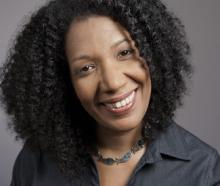
Editor’s note: The following written testimony was submitted by Lisa Sharon Harper, on behalf of Sojourners, to be included in today’s U.S. Senate Committee on the Judiciary Subcommittee on the Constitution, Civil Rights, and Human Rights Hearing on “Ending Racial Profiling in America.”
As a Christian organization, Sojourners is compelled to consider the pattern and institution of racial profiling practices abhorrent and a direct threat to the maintenance and cultivation of the inherent dignity of every human being living and working within the boundaries of the United States. We believe every human being is made in the image of God and therefore equally worthy of protection of human and civil rights under the law. Racial profiling not only threatens the psychological and emotional well-being of targeted communities. As demonstrated above, the practice can lead to death.
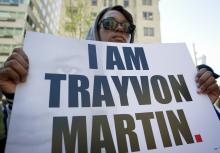
Today I search my soul along with many Americans who are discussing the Trayvon Martin tragedy. These conversations can range from news blogs clamoring for justice to benign disputes about the facts of the case by office water coolers. One of the more challenging conversation threads recently came in the form of a status update on Facebook. My colleague, Efrem Smith, lamented:
"Shouldn't the young black males who are victims of black on black crime get the same attention as Trayvon Martin? I say yes."
I believe Efrem's statement could have us conversing for months to come should we be bold enough to lovingly engage.

Jean Younis won’t be wearing an Easter bonnet at church this Sunday. Instead, the office manager at Bonita Baptist Church in San Diego will don an Islamic headscarf to support the family and friends of Shaima Alawadi, the Iraqi immigrant and mother of five who died March 24, three days after being beaten in her home in El Cajon, Calif.
“I do expect a reaction, but that’s the point. It needs to be discussed,” said Younis, 59, who predicted that most church members would be supportive or respectfully inquisitive.
She is one of many non-Muslim women to post photos of themselves wearing a headscarf on “One Million Hijabs for Shaima Alawadi,” a recently created Facebook Page that had nearly 10,000 likes on Monday (April 2) and hundreds of photos. Others posting on the page have identified themselves as Catholics, Quakers, Mennonites, Jews, Pagans, and atheists.

Trayvon Martin's slaying has ignited a national discussion on race and privilege.
Many of us recognize that Trayvon’s untimely death is not an isolated incident.
Racial profiling. Discrimination. Enmity. Suspicion. Intimidation. Fear. Hate.
For far too many Americans, these are everyday realities.
As Christians, we are called to fight injustice and work to heal the broken systems — and broken relationships — of the world. We act, with Jesus Christ, to bring about reconciliations — between people, people groups, communities; within (and between) organizations, institutions, and social systems.
Think Progress reports that Rep. Bobby Rush (D-IL) was today removed from the floor of the House during an impassioned speech against the murder of Trayvon Martin.
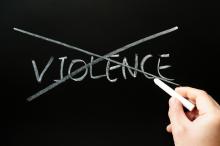
It's ripped from the headlines: A young person is killed, but the police seem to be casting aspersions on the victim. It outrages us when it happens in Florida, and it should outrage us just as much when it happens further south.
It was not one person but five who were found murdered on March 15 in the town of San Isidro, Cauca, Colombia. They had been bound hand and foot and shot in the head. As in the case of Trayvon Martin, race was a factor: the victims were ethnically indigenous.
As I saw for myself when I visited Cauca last year, indigenous people in Colombia are (along with other historically marginalized groups) often stuck between a rock and a hard place —attacked or driven from their homes by both guerrilla insurgents and right-wing paramilitaries, both of which want to control territory and each of which accuses neutral parties of supporting the other side.
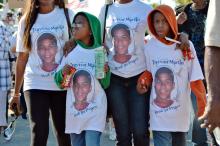
I don't want to say too much. I don't want to over-explain. I know that leaves lots of room for misinterpretation. I just want to ask you to wrestle with a few questions.
I was asked last week what my greatest fear as a father of a black boy is in light of the Trayvon Martin murder. My greatest fear for my children is the cautious regret I see on the many faces that can’t help but leave open the possibility there may be some justification for this tragedy. Rest assured George Zimmerman and his supporters will exploit this deep-seated immutable suspicion, just like Susan Smith did so many years ago.
When I left the Sojourners office Monday evening in the formerly blighted, now Disney-fied, Columbia Heights neighborhood of Washington, D.C., I walked a half-block and joined a multiethnic, multigenerational crowd that had gathered in front of the luxury Park Triangle apartments. In the middle of an open square shared by the entire Columbia Heights community, nearly 100 people stood in a circle braving the decidedly un-springlike arctic chill.
We listened intently as an ordinary D.C. resident stood in the middle of the circle with a bullhorn and shared from the heart. “Forgive us," the unnamed gentleman pleaded. "George Zimmerman was Latino. The horrible atrocity that has rocked our nation was committed by a Latino man. I am Latino. I ask for your forgiveness on behalf of my community.”
Then he went on to explain how there have been long-standing tensions between African-Americans and Latinos and that we must begin to deal with them.
“Forgive us,” he pleaded again.
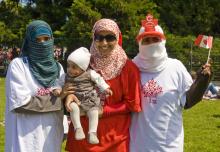
A new poll shows that more than half of all Canadians distrust Muslims.
The nationwide survey indicates that as many as 52 percent of Canadians feel Muslims can be trusted "a little" or "not trusted at all." The poll showed that 48 percent of respondents said Muslims can be trusted "a lot" or "somewhat."
What's more, 42 percent of Canadians said discrimination against Muslims is "mainly their fault."
Muslims registered the lowest levels of trustworthiness of the religious groups asked about in the survey.
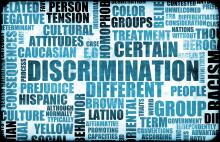
This is largely addressed to my white brothers and sisters, particularly those in the church. I’m a white woman, was raised in an almost all-white town and have spent most of my life in predominately white faith communities. White people don’t like to talk about racism. We like to pretend it isn’t real and we don’t benefit from it. This has got to stop.
When Barack Obama was elected president, there was all kinds of talk about the United States being a post-racial society. This was, and is, total BS. It was (and is), however, a really nice bedtime story us white folk can tell to our kids and to ourselves. Rest easy, everyone. Racism is dead. No need to worry about race anymore. Go to sleep, sleep. sleep …
Every once in a while, we (by we I mean my white brothers and sisters) wake up from our little racism-doesn’t-exist slumber. When a celebrity says something out loud that we know is something you just don’t say (inner voices, white brethren) we get all up in arms and demand an apology. Then we go back to sleep. While we sleep, some of us clutch our purses on the train, lock our doors when we drive through minority neighborhoods or cross the street when groups of dark-skinned men stand in our path. We tell ourselves that we are doing it for our own safety, if we realize we are doing it at all. We make assumptions about people’s intelligence, responsibility, work ethic and a whole host of other things based on the color of a person’s skin. I do not exclude myself from this description. I do it too.
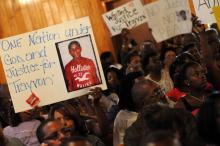
On February 26, 2012 in Sanford, Fla., George Zimmerman shot and killed Trayvon Martin, an unarmed 17-year-old boy. Zimmerman, 28, a neighborhood watch "captain," says he was acting in self-defense, and — incredibly — Zimmerman has yet to be arrested or charged with a crime.
However, thanks to the organizing efforts of Mr. Martin’s parents, civil rights groups, media commentaries, and concerned citizens, our latest racialized miscarriage of criminal justice is now getting the widespread attention that it deserves.
On Monday, the US Department of Justice and the Federal Bureau of Investigation (FBI) announced it would launch an independent investigation into the causes and circumstances of Mr. Martin’s death.

During a roundtable chat with a group of emerging young evangelical leaders recently, someone posed the question: “Has America become a post racial society?”
Well, we haven’t had a race riot in a while — does that mean race isn’t relevant anymore?
A black president just gave the State of the Union Address. How about that? Does that mean America’s OK with the race thing?
Our nation is a more ethnically diverse nation than it’s ever been. Does that count for anything?
Scholars across disciplines agree that what we think of as “race” literally was invented here in the 17th century to delineate castes within a system of extreme privilege and subjugation.
So, rather than thinking about the dreaded word, “racism,” to answer the question, perhaps it would be more helpful to think about how our society has been “racialized” and then ask if such a racialization still exists or reverberates in today's American culture.

Author Melissa Harris-Perry recently appeared on “The Colbert Report” to speak about her new book, Sister Citizen, which examines a number of stereotypes of African-American women. As he often does, Colbert teed up a common conservative talking point about “going back to he good old days.” Perry’s response kept ringing in my head for days afterward.
She said that there is no time in American history you would want to go back to as a black girl.
The point is simple but compelling. Those in the position of privilege to write history are the ones whose story is most prominently told. So when we talk about going back to some better time, it’s with the lens of that same privilege that we’re looking back.
The fact is that, unless you’re a white, Christian, straight male, there’s little to look back to and say, “Yeah, I was better off back then.”

I was a Star Wars kid. I was almost six years old when the first movie hit theaters and it blew my mind, as it did the minds of all my friends. We all wanted to grow up either to be Darth Vader or Obiwan Kenobi, depending on your particular bent.
Not for nothing, but I did tear up when Vader finally died. Kenobi just wasn’t as cool.
The Star Wars saga helped define pop culture in many ways throughout my childhood. And so George Lucas, creator of the epic films, was the cinematic god of our youth. And if anyone has juice in Hollywood to get things done, it’s Lucas, who owns Lucasfilms (his own production company). So if there’s a film he wants to get made, it’s going to happen.
Unless the stars of the movie are black, that is.
My adoptive dad’s family goes back five generations in Mississippi. They endured the most ruthless lashes of American slavery and the most brutal state-sponsored terrorism during the Jim Crow legal regime. In fact, my dad personally had a brush with the Klan as a child. The Ku Klux Klan broke up an evening meeting at his grandparents’ church in the early 1950s. He doesn’t remember much about the night, except the terror. In his adult years, he looks back and realizes they were probably organizing.
Organizing… in Mississippi… before Rosa Parks said “No” in Montgomery, Ala. My grandparents were organizing.
Yet even my family history—along with images of sneering white southerners during the desegregation of Little Rock High School, complicit whites riding near-empty buses during the Montgomery bus boycott, and white officers hosing down black children in Birmingham, Alabama—did not prepare me for what I encountered when I traveled to Montgomery, Alabama, last month.
I boarded a plane in Washington, D.C., to fly to Montgomery early on December 17. There I would conduct Sojourners Organizing training for Immigration Reform in partnership with the Greater Birmingham Ministries (GBM), a faith-based organization dedicated to building more just communities and systems in Alabama.